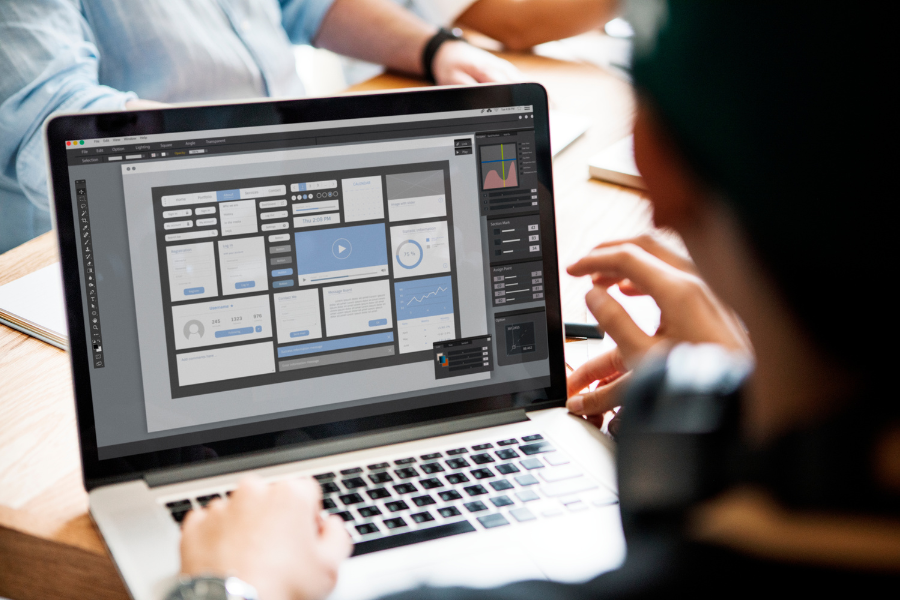Home / Functional Web Design / Web Design / Web Designer vs. Web Developer: Roles and Responsibilities
Key Takeaways
- Web designers focus on the visual aesthetics and user experience of a website, while web developers ensure its functionality and technical implementation.
- Effective web design encompasses user interface design, visual design, responsive design, and user research, all contributing to a positive user experience.
- Web development includes front-end development (user interface) and back-end development (server-side logic and databases).
- Collaboration between web designers and web developers is important for creating successful websites that are both beautiful and functional.
- Choosing between a career in web design or web development depends on your interests, skills, and career goals, with both paths offering rewarding opportunities in the digital landscape.
The demand for web professionals has never been higher as businesses and individuals desire to create functional, user-friendly websites. Many are still unclear about the roles of a web designer vs web developer. While both are essential in building a website, their responsibilities and skill sets are very different. Understanding the difference between web designer and web developer is essential to knowing how each contributes to a website’s success.
A web designer focuses on the visual parts of a website, including UI design, UX design, and ensuring the site is visually appealing and easy to guide. A web developer is responsible for making the website work by using coding languages like HTML, CSS, JavaScript, and different web development frameworks. They focus on the technical side, ensuring the site functions properly and runs smoothly. This article will explain the web designer and web developer roles, dive into their unique skill sets, and explore topics such as website design vs website development, and how to decide when to hire a web designer vs a web developer. It will also cover the importance of responsive design and how front-end development and back-end development differ in terms of expertise and tasks.
Web Design and Its Impact on User Experience
Web design plays an important part in shaping a website’s user experience. It’s the first thing visitors notice when they land on a website, and it has a direct impact on how they perceive the brand. A well-designed website can encourage users to stay and explore, while a poorly designed one can make them leave instantly.

Web design is not just about making a website look visually appealing; it’s about creating a smooth, simple to use experience that helps users find what they’re looking for. A web designer carefully plans the layout, structure, and flow of the site to guarantee it is both visually attractive and user-friendly. The primary goal is to guide visitors through the website without confusion, leading them to take the desired actions. The importance of web design is user-centered design, where every element, such as colors, fonts, and button placement, is chosen with the user in mind. The purpose is to create an experience that is easy to use, enjoyable, and effective for the target audience.
Essential Responsibilities of a Web Designer:
- User Interface (UI) Design: This involves creating the visual layout and structure of the website, guaranteeing it’s easy to navigate and understand. A web designer’s UI expertise ensures that users can effortlessly find the information they desire on a website.
- Visual Design: This focuses on the aesthetics of the website, using colors, typography, imagery, and other visual parts to create a solid and engaging look and feel. A web designer’s visual design skills provide a website that is visually appealing and aligns with the brand’s identity.
- Responsive Design: With the addition of devices (desktops, laptops, tablets, smartphones), it’s important that websites adapt easily to different screen sizes. This is where responsive design comes in. A web designer ensures a website looks and functions perfectly on any device, providing an optimal viewing experience for all users.
- User Research & Testing: To create truly user-centered designs, web designers conduct research to understand their target audience’s needs, behaviors, and preferences. This may affect surveys, interviews, and usability testing. A Web designer tests their designs with real users to identify areas for improvement and guarantee a smooth and enjoyable experience.
Web designers play an essential part in shaping how users experience a website. They use design parts to communicate a brand’s message clearly and guide visitors through the website in a way that is easy to guide. Their job is to make sure the site is not only functional but also visually appealing and user-friendly, creating an experience that is enjoyable and memorable for the user.
Web Development and How It Brings Design to Life
Web designers focus on the visual parts of a website, ensuring that it looks appealing and provides an enjoyable user experience. They create the layout, color scheme, and overall design to guide users smoothly through the website. This design would not be effective without the work of web developers. Web developers are responsible for bringing the designer’s vision to life, and making sure that the website functions properly. They handle the technical side, using coding languages like HTML, CSS, and JavaScript to build the framework and implement parts.

Web developers turn the web designer’s concept into a fully functional site. They handle tasks such as writing code, integrating interactive elements, and ensuring the site performs well across different devices and browsers. They also guarantee that the website is secure and that any necessary back-end processes, like databases or user logins, work smoothly. In short, while web designers focus on creating a visually engaging experience, web developers make sure the website works as expected, delivering a smooth experience to users.
Web development covers different specializations, but two main areas are most important:
- Front-End Development: This focuses on the user interface (UI) – the part of the website that users interact with directly. Front-end developers use languages like HTML, CSS, and JavaScript to bring the designer’s idea to life, creating interactive elements, animations, and dynamic content that enhance the user experience. Front-end developers use code to animate the website’s interface, ensuring it responds to user actions and provides engaging interactions.
- Back-End Development: This concerns the server side of the website, which is responsible for making the website’s features work properly behind the scenes. Back-end developers use languages like Python, Java, and PHP to build the logic that drives features like user logins, database interactions, and content management systems. Back-end developers manage the elaborate interplay of server-side components, guaranteeing data flows smoothly and the website functions reliably.
Key Responsibilities of a Web Developer:
- Writing Clean and Efficient Code: Clean and well-organized code is essential for maintaining and growing a website. Developers aim to write code that is easy to understand, update, and fix, making sure the website can be easily adjusted as new needs or updates arise in the future.
- Implementing Website Features and Functionality: From simple contact forms to complex e-commerce platforms, developers are responsible for bringing the website’s features to life. They write the code that enables users to interact with the website, perform actions, and access information.
- Integrating with Databases and APIs: Many websites rely on databases to store and manage information, and APIs (Application Programming Interfaces) to connect with external services. Developers ensure smooth integration with these systems, allowing the website to access and utilize data effectively.
- Ensuring Website Security and Performance: Website security is very important. Developers put security measures in place to protect user data and prevent attacks. They also work on improving website performance by guaranteeing it loads quickly and works smoothly.
Web developers play an essential part in making our online experiences smooth, engaging, and secure. They work hard behind the scenes to solve problems and create the digital systems that keep websites running. Web development is not done alone; it relies on collaboration, especially with web designers.
The Collaborative Relationship Between Web Designers and Web Developers
Web designers and web developers play complementary roles in creating a successful website. While their tasks are different, they must work closely together to guarantee the website is not only beautiful but also functional and effective. Web designers focus on the layout, color scheme, and overall look of the site, while web developers take those designs and turn them into a fully working website by writing code and handling the technical side. Their combined efforts are important in building websites that are both engaging for users and capable of meeting business goals.

Collaboration between web designers and developers is ongoing and essential throughout the entire website creation process. It starts early, with brainstorming and planning, and continues through the design phase, development, and final launch. They constantly communicate, share feedback, and adjust the design or functionality as needed to make sure the end result matches the client’s vision and works smoothly for users. This teamwork guarantees the website not only looks good but also provides an enjoyable and efficient experience for visitors.
Essential Parts of Collaboration
Cooperation between web designers and web developers is important throughout the entire website development process. Their work involves different stages, and they need to work together at each step. Here are some essential parts that show how their collaboration plays an essential part in creating a successful website:
- Understanding the Client’s Vision: Designers and developers work together to understand the client’s goals, target audience, and desired functionality for the website. This shared understanding forms the foundation for their collaborative efforts.
- Translating Design into Code: Designers provide developers with visual mockups, wireframes, and style guides that outline the website’s appearance and user interface. Developers then use their coding expertise to translate these designs into a functional website, ensuring the visual parts are implemented accurately and efficiently.
- Problem-Solving and Innovation: During the development process, challenges and unexpected issues may occur. Designers and developers collaborate to find creative solutions, using their respective expertise to overcome obstacles and guarantee the project stays on its path.
- Testing and Refinement: Before launch, designers and developers work together to test the website thoroughly, identifying and resolving any bugs or usability issues. This cooperative testing guarantees the website functions smoothly and provides an optimal user experience.
Benefits of Collaboration
The partnership between web designers and web developers offers many benefits, helping to make a website project successful. Here are some essential advantages:
- Enhanced User Experience: By combining design aesthetics with technical functionality, collaboration leads to websites that are both visually appealing and user-friendly, resulting in a more engaging and satisfying online experience.
- Improved Website Performance: Collaboration ensures that design choices are implemented in a way that optimizes website performance, leading to faster loading times and smoother functionality.
- Increased Efficiency and Productivity: Clear communication and shared understanding between designers and developers simplify the development process, reducing errors and ensuring timely project completion.
- Innovation and Creativity: The exchange of ideas and perspectives between designers and developers fosters a creative environment that encourages creation and leads to more effective website solutions.
The relationship between web designers and web developers is highly beneficial, with each part complementing the other. When they work together and communicate openly, they are able to create better digital experiences that are more effective than if they worked separately.
Choosing Between Web Design or Web Development
Understanding the roles of web design and web development helps you decide which career path suits you best. Both fields offer great opportunities, requiring different skills, interests, and goals. Web designers focus on creating the look and feel of a website, using design tools and principles to guarantee websites are visually appealing and easy to navigate. Web developers handle the technical side, using coding languages and frameworks to make websites work properly and efficiently.

Choosing web design or web development depends on your interests and strengths. Web designers focus on creativity, design, and user experience, making websites visually engaging. Web developers work with logic and code, solving problems to ensure the website functions as intended. Both roles are essential in website creation and offer unique challenges and rewards based on personal skills and preferences.
To help you decide, consider these factors:
- Your Interests and Skills: Consider your interests and skills when choosing between web design and web development. Web designers focus on creating visually appealing websites and user-friendly interfaces. Web developers focus on coding and building the functionality behind the website. Both paths require different skills, with web design leaning toward creativity and web development focusing on technical problem-solving.
- Career Goals: Consider your career goals when choosing between web design and web development. Web designers and developers can work independently as freelancers, within design agencies, or as part of a larger company’s in-house team. Each path offers different work environments and opportunities for growth depending on your preferences.
- Learning Style: Your learning style plays a part in choosing between web design and web development. Web design and development both require staying updated with new technologies, but web design may involve more visual and creative learning, while web development focuses on technical skills and coding.
- Personality Traits: Personality traits can influence your choice between web design and web development. Web designers often work closely with clients and succeed in cooperative environments, focusing on creativity and communication. Web developers tend to prefer more focused, analytical tasks, requiring attention to detail and problem-solving.
Skills and Qualifications:
- Web Design: A strong portfolio showcasing your design talent is essential. Proficiency in design software like Adobe Photoshop and Illustrator, along with a solid understanding of design principles and user experience (UX), is essential.
- Web Development: Mastering programming languages like HTML, CSS, and JavaScript is fundamental. Depending on your focus (front-end or back-end), you may also need to learn languages like Python, Java, or PHP.
Career Paths:
- Web Design: You can pursue parts as a UX/UI designer, visual designer, or web design specialist, working freelance, in agencies, or within in-house teams.
- Web Development: You can specialize in front-end, back-end, or full-stack development, with opportunities in freelancing, agencies, or as part of development teams across different industries.
Both web design and web development are industries that are always changing. To succeed in either field, it’s important to keep learning and stay interested in new technologies. Embrace the challenges, explore new tools, and keep improving your skills to stay updated and successful.
Web Designer vs Web Developer in the Digital Industry
Web designers and web developers each play an essential part in creating a website, with different responsibilities. Web designers focus on the visual parts of a site, ensuring it is attractive, easy to guide, and provides a positive user experience. They handle design elements like layout, color schemes, and fonts. Web developers, in contrast, are responsible for the technical side of the website. They use coding languages such as HTML, CSS, and JavaScript to bring the designer’s vision to life and ensure the website functions smoothly, performs well, and is secure. Collaboration between these two roles is essential for creating a successful website.

Choosing between web design and web development depends on your interests, skills, and career goals. Web design involves creativity, attention to detail, and user experience, while web development requires coding skills, problem-solving, and technical knowledge. Both fields offer great opportunities, including working independently, in a design agency, or as part of a larger company. Both industries are constantly growing, so continuous learning is important to stay current with new trends and technologies. Understanding these roles and how they work together will help you make an informed decision on which path suits you best.
Why Partner with Us for Your Web Design and Development Needs
Partnering with us guarantees you receive a simple combination of design and development expertise, creating a website that is both visually appealing and fully functional. Our team understands the importance of cooperation between web designers and web developers, and we work together to bring your idea to life. We have years of experience in both fields, making sure the final product not only meets your expectations but also delivers an excellent user experience and strong performance. We are committed to delivering high-quality websites using the latest trends and technologies. This guarantees your website will be reliable, secure, and able to grow alongside your business needs.
Contact us today to start building the website you’ve always wanted. Our team of experts in both web design and development will help bring your idea to life.


